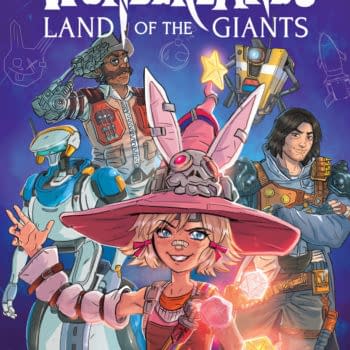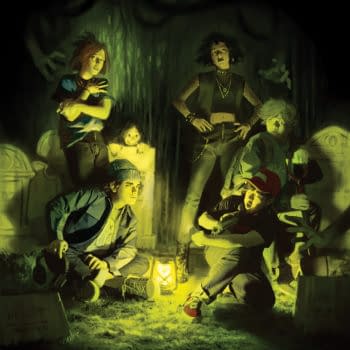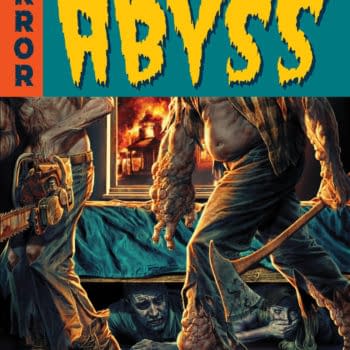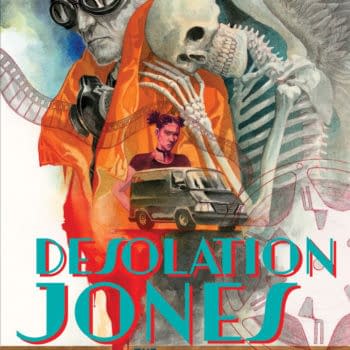Posted in: Comics | Tagged: art, Barbara Kesel, Comics, creative writing, dark horse, Drawing, entertainment, Wondercon 2015
WonderCon '15: Down With Creative Block! Banishing The Blank Page With Barbara Randall Kesel
By Michele Brittany, West Coast Bleeding Cool Correspondent

There are going to be days when you look at a blank page and look at your calendar or watch, stressing that you have a deadline approaching. Armed with a tall cup of java, Kesel kicked into high gear and turned on her auctioneer voice and sped through several tips and tricks for breaking through and filling that blank page.
Physically get up and turn around 180 degrees. Kesel said that by doing that, we are taking the things that are routine and shaking them up. She said that you may have noticed that if you are driving somewhere, using the same path you use every day, that when you get to your destination, you realize you don't remember being aware of your drive. This is because your brain is on auto-pilot and isn't really paying attention. By just changing your perspective, you are shaking your brain out of its zombie like state and getting it to actually pay attention and be observant.
Take a class that challenges a weakness. For example, Kesel said if you are an artist, try taking a calligraphy class that uses different artistic muscles. Get out and go somewhere different where you will be simulated by the change in environment. Once you have done either of these tips, get your butt back in your chair and the ideas will come to your brain and you will be on your way.
For writers, Kesel said to read, read and read some more. She stated that she reads one subject for an hour and will then change and read a different subject matter. This results in a fresh approach to putting words together differently. For artists, she suggested visiting a museum of art, which is fodder for discovering new perspectives.
Besides breaking the block, why are doing these important? Kesel tells it like it is with the audience and said "no one owns you support – you have to give them something fresh."
She then provided her next tip. "Who is your global opposite?" Write from that point of view, justifying their opposing view. Play with familiar tropes. Kill your hero off. Write the protagonist as an anti-hero.
Still haven't pushed through the block? Kesel said to try the 15-minute rule. Spend 15 minutes on a project you don't want to work on. Once you do, you might just get into a groove push through. Or, it might just be more of a move one brick technique, then put the project aside and work on another project. At the very least, you are making incremental progress.
In art, Kesel provided the example of her artist ex-husband when he got his comic book pages. He would put them in sequential page order. He would leave the title page on his desk and put all the other pages in a drawer. Each day he would work on the subsequent page. If he had problems with a page, he would put it aside after working on it for the one day. By the time he came back to the page, he would have had several days for his brain to figure out how to break the block that was stopping him.
Your emotions do impact your art and writing. If you are not engaged with your project it will show to your audience. Find something in it that makes you smile and/or chuckle – it will make the different.

Kesel revealed that artists must figure out what their page rate is – in other words, what is the rate of production. She stated it should be one page of finished art per day. If you don't know, Kesel suggested taking a one to two week vacation and work on art. Do you get to one page of art per day? Writers, you were not excluded in this section. Kesel said that writers should be able to write five script pages per day.
Another audience member said they struggle with self-doubt. She said this fell into the "poopie rule" which means that no matter what you do, someone will think it sucks. To that, Kesel said, "do it anyway!"
Juggling new ideas was another issue faced by an audience member. Kesel said she encounters this often. Basically it happens when you are working on one project and your brain comes up with some new, shiny idea it is trying to sell you. She said she stops long enough to write what the idea is and some details, so she can return to it later after her current project is done. It's a matter of prioritizing ideas.
Do I know the subject? Kesel suggested finding an expert to interview. Don't know how much research is enough? "Do enough research to respect the field," Kesel stated.
The dreaded re-writes. The best way to counter the perfectionist in you who will re-write until the zombie apocalypse, is the set a deadline and honor it. It's also important to let the project air out by getting the voices out of your head completely before returning it Kesel told the group.
What if I think its bad? Kesel replied that if you truly feel that way then it "means you are not in sync with your art or writing." It may just take doing some exercises to get you to the appropriate level so that you are sync, or perhaps you haven't found what gets you engaged with your project.
Characters sound the same was the last issue that Kesel had time to address. She advised to go out and record various conversations then transcribe them. Take a look at the cadence of speech for ideas on how to create unique character voices. Kesel did warn to not use television and movies because they are not really real life exchanges of conversations, but mediated by a writer or writing team already.
And with that, the hour was up and we were all a bit wiser and armed with breaking through our respective creative blocks the next time we encounter them.
Michele Brittany is an independent popular culture scholar and semi-professional photographer and editor of James Bond and Popular Culture: Essays on the Influence of the Fictional Superspy (McFarland & Company). She regularly posts reviews and analysis on the spy/espionage genre on her blog, Spyfi & Superspies and can be followed at Twitter @mcbrittany2014.















